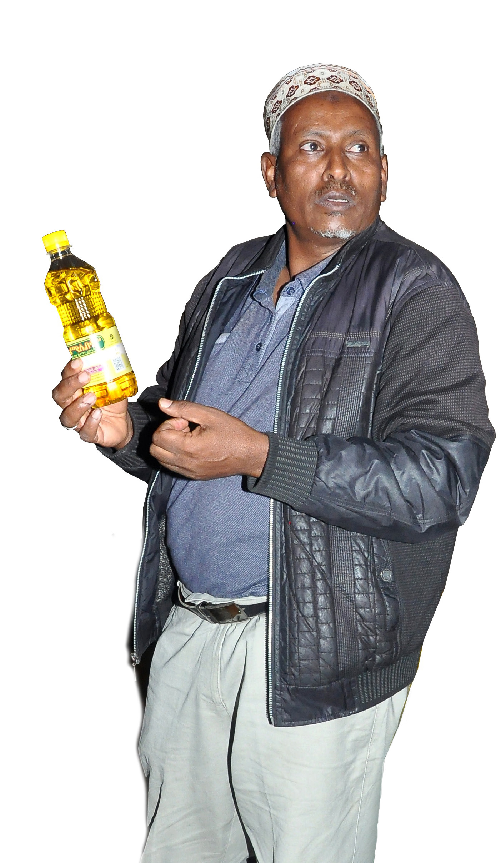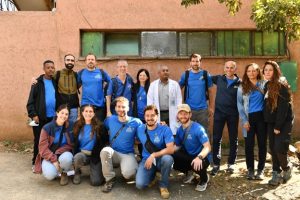
A businessman reinforcing his knack with education
Reports indicate that the country imports more than 40 million liters of palm oil per month. Local edible oil producers cover less than 5% of the national total annual edible oil demand. As oil seeds [Sesame, Peanuts, Niger Seed and Sunflower] are among the country’s outstanding export items, local-edible-oil producers voice complaint about shortage of affordable oil seeds supply.
Kibe Leminie Edible Oil Factory was established with a single oil refinery in 1998 with a total capital of 5,000 Birr. It is run by one person (the owner). Its current capital exceeds 50 million Birr.
The Ethiopian Herald held minutes of togetherness with the company’s founder and owner as well as Ethiopian Edible Oil Producers’ Association Vice President Wudu Hassen. Excerpts.
Owner and Founder of Kibe Leminie Edible Oil Factory Hajj Wudu Hassen Nurye was born in Gonder Fogera district in Woreta town. Up to grade 12, he learnt at Woreta Primary and Secondary School.
He started business with his family, while 20. He was pursuing his modern and religious education parallel to doing business. Four decades back, his family was doing business heading even to far flung corners of the country transporting goods mostly on the back of pack animals. Often, they hauled stocks and goods to the rural areas and brought back oil seeds, cheese, honey and other agricultural products to Woreta town for sale. Following the coming of the Dergue regime to power, the family focused on urban market especially bakery. At that time he actively participated in doing business and supporting his family.
He went to Ehud Gebeya and Nabaga Gebeya market places known in Fogera Woreda. These market squares partly abut the largest Ethiopia’s Lake Tanna. Thus, they were forced to cross a bit marshy lake swimming to facilitate their trade. He had joined the business sector this way.
He recalled that before the coming of the Dergue regime, the market square was active from Monday up to Friday. But, the Dergue regime fixed a single market day . The pretext for this was to save working days.
By the time bread was being transported from Bahir Dar and Gonder to feed residents of Woreta town. Following this, the idea of selling bread to residents of the town occurred to him. Hence, he started doing it after deciding among his family.
Apart from actively engaging in business, he also actively participated in Kebele youth associations for more than 10 years.
Regarding pursuing his education, he had taken grade 12 School Leaving Certificate Examination and scored 2.8. During that time, for such a score, university admittance was possible based on quota. He and his best friend Kassahun scored equal points. Wudu was given a green light to join Hawasa University considering his active participations in Kebele Youth Association. But, his best friend could not get admittance to the university.
Surprisingly, Wudu did not opt to go to Hawasa University. Rather he declined taking the chance facilitating things for his friend Kassahun. So they [Wudu and Kassahun] wrote an application letter to the Ministry of Education asking Kassahun to join university on behalf of Wudu.
Then, he made a point strengthening his business. But, he joined Bahir Dar University Peda campus to attend education. Following the political struggle between the government and oppositions fronts, he disrupted his one year stay in Peda.
Back from Peda to his birth place, he tried to start different businesses. Transporting stock goods from Addis Ababa to his hometown turned his day-to -day activity.
“As my elders were females and married I was the first male to the family who lent a hand in handling demanding tasks. Thus, all of my family members espoused my idea and bent of doing business. During those years, hope and faithfulness were considered as great assets. Integrity was worth its weight in gold.”
While I heard that one person in Gondar town wants to sell a car, I bought from him an OM 110-27 seat automobile. I gave him over half of the total price Birr 65,000 as a first payment .I promised I will settle the rest making money. In the good old days, as collateral, it suffices lenders know you, your relatives and friends while trading any goods,” he said.
Apart from the transportation service, he brought 3 up to 4 mill machineries to the rural areas toward the effectiveness of his business. “Operating mills draws one more to handling machineries. Some of my machineries suffered damages during the then confrontation between Dergue and Tigray Peoples Liberation Front (TPLF).This made me turn my attention to edible oil production. After, undertaking a deep study on what type of business to do I totally moved to Addis Ababa in my relative home at the end of 1980s referencing the unrest to do business in my hometown.”
In 1998, he rent a small shop in Megenagna inside Sholla market place and started to sell spices and other goods. Then he decided to rent another cooperative hall in the area to launch edible oil processing. He bought small oil processing [3-4 barrel per day] machinery with the financial assistance of his relatives. Seeing that the oil market attracted a good number of customers, he came up with the second oil processing machinery to expand his oil business.
“Most of the time, I and my wife work round the clock to operate the machinery including 3 or 4 laborers. Then, I decided to expand my business as the demand for our product was growing and allowing me a good income. Following the new investment proclamation, in 2001, I requested land for investment in Sebeta. And my request was accepted the coming year. I want to develop this new investment site as my wife covered my duty there. I have bought new oil processing machinery in the new site. I want plant and run both sites parallel,” he elaborated.
Currently, the company administers more than 68 employees and 6 oil processing machineries. Our current total machineries’ processing capacity is more than 990 quintals edible oil inputs. Out of this amount, we can produce more than 20,000 liters of edible oil per day. But, practically we are producing not more than 2,000 liters of oil per day. This is mainly due to the dearth of enough oil seeds inputs, lack of modern market channel to buy the oil seeds and power interruptions, he indicated.
“We want to have direct link with the oil seeds producer farmers. The intervention of illegal brokers in oil seeds market is challenging our factory’s production.”
He aspires to see that his company could contribute its part in the endeavors to meet the national edible oil demand. To create more job opportunities to the youth and playing a meaningful role at individual and national level will be his company’s dream, he emphasized.
“The major challenge as a local edible oil producer is the Value Added Tax (VAT) that hinders us from operating with our maximum potential. The government should entail edible oil in the basic consumption foods list like flour and sugar. Because edible oil products, like palm oil imported free of VAT from abroad, are casting a shadow on us not to be competitive in the market. Thus, the consumer is now buying with VAT of 15% per a liter of oil,” he said.
The other drawbacks of the sector are the lack of a modern market channel. Purchasing edible oil inputs also puts its pressure on our survival as we buy the oil inputs [oil seeds] from brokers.
Currently, there are three types of local edible oil producers, according to him. “Fiftyne per cent VAT registered, 2% cash registered licensed legal producers and non-licensed illegal producers without taxation that distribute oil in Merkato and other market places.
The number of legal licensed VAT centered producers number is decreasing from time to time following the restricted business system. Thus, the government should prioritize modernizing the trading system and solving these problems,” he stressed.
This father of four oil business runners believes in the asset and power of education. His first son is a chemical engineer, while the second and third daughters pursue education in electrical and civil engineering respectively. His youngest daughter, who is 10 years old, is a grade five student.
To demonstrate that education is power he pursued management in university, while his children were in high school. “The main reason for this is to trigger the passion of my children. I wanted them to know how much I am thirsty of education and how I sacrifice my precious time of doing more business. My life is wedded with education,” he concluded.
The Ethiopian Herald June 30, 2019
BY TEWODROS KASSA





